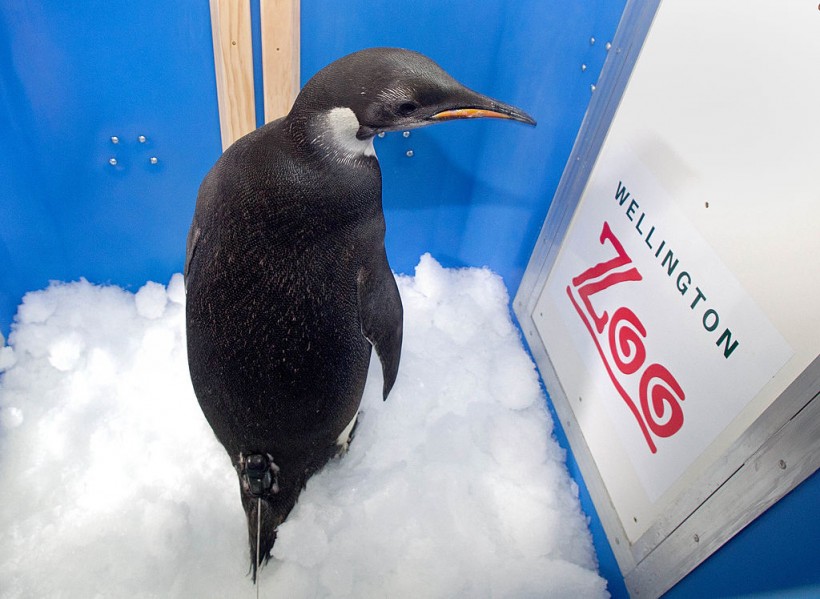Emperor penguins, the tuxedo-clad giants of the Antarctic, are facing an existential crisis. A recent study published in Physics Today paints a grim picture for these iconic birds, revealing the devastating impact of climate change on their sea ice habitat.
Shrinking Nurseries: A Life-and-Death Struggle for Chicks

(Photo : Marty Melville/AFP via Getty Images)
For emperor penguin chicks, the vast expanse of Antarctic sea ice isn't just a frozen landscape - it's a nursery essential for survival.
Imagine a world where your nursery walls melt away before you can even walk. That's the harsh reality for emperor penguin chicks reliant on stable sea ice platforms for their first crucial months.
These platforms provide a safe haven for chicks to hatch, develop their waterproof feathers, and hone their swimming skills under the watchful eyes of their parents.
However, rising global temperatures are wreaking havoc on this critical habitat. The study reveals a disturbing trend: sea ice is melting earlier and breaking up sooner, leaving young chicks vulnerable and exposed.
The devastating consequences of 2023 serve as a stark reminder. Record low sea ice extent resulted in the second-highest chick mortality rate ever documented.
Fourteen emperor penguin colonies faced this tragedy, with chicks forced into the icy water before they were fully waterproofed. This premature plunge often leads to drowning and hypothermia, slashing chick survival rates.
The study goes beyond chick mortality, highlighting the impact on their overall health. Chicks raised on unstable, melting ice platforms tend to be lighter and have weaker muscles, further hindering their ability to survive in the harsh Antarctic environment.
Also Read: Time is Running Out for the Beloved Emperor Penguin
A Looming Population Collapse: Can Emperor Penguins Adapt?
The dwindling sea ice poses a dire threat to the long-term viability of emperor penguin populations.
If climate change continues its relentless assault on their habitat, these birds may struggle to find suitable breeding grounds and raise future generations. Scientists fear this could lead to a catastrophic decline, with some colonies potentially facing extinction.
The study's projections are chilling. It warns that a business-as-usual approach to greenhouse gas emissions could result in a staggering 99% decline in emperor penguin populations by the end of the century.
While some colonies have been observed attempting to adapt by relocating to more stable ice shelves, experts view this as a temporary solution at best. The rapid pace of climate change far outstrips the emperor penguins' natural ability to adapt.
This latest study underscores the urgent need for stricter measures to combat climate change.
By transitioning to renewable energy sources and drastically reducing our carbon footprint, we can mitigate global warming and offer a lifeline to emperor penguins and countless other species reliant on a healthy Antarctic ecosystem.
The fate of these majestic birds rests in our hands. Emperor penguins are a vital part of the Antarctic food web, and their decline would have cascading ecological consequences.
Their plight serves as a powerful symbol of the broader threat climate change poses to our planet's biodiversity.
The time for action is now. We must act decisively to protect these remarkable creatures and ensure a future where their captivating courtship rituals and resilience continue to grace the frozen plains of Antarctica.
Related article: Emperor Penguin Population Decline: Climate Change, Sea Ice Loss Make it Challenging to Survive
© 2024 NatureWorldNews.com All rights reserved. Do not reproduce without permission.



![Venomous Centipede Could be Game-Changer and Save Lives of People with Kidney Disease [Study]](https://1471793142.rsc.cdn77.org/data/thumbs/full/70407/280/157/50/40/venomous-centipede-could-be-game-changer-and-save-lives-of-people-with-kidney-disease-study.jpg)

